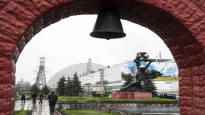The war in Ukraine has also attacked nuclear power plants, which according to international agreements should be excluded from military action. The British newspaper The Economist covered events at the Chernobyl power plant during the Russian occupation.
Russian forces invaded the Chernobyl nuclear power plant on the second day of the war and held it for 38 days.
Radioactive waste is stored in the decommissioned power plant. A 30-kilometer-wide protection zone has been formed around it, partly on the Ukrainian side and partly on the Belarusian side.
Staff issued an alarm after hearing the sounds of fighter jets and bombings near the power plant.
The Economist (moving to another service)(behind the payment wall) has found out from the employee interviews that the seizure time of the power plant has lasted for more than a month. Among other things, the plant’s safety manager has been interviewed about the plant’s danger weeks Valeri Semenovia.
There were 103 people at work in Chernobyl on the day of the attack. Workers normally travel to the facility by commuter train from Slavutych, but they decided to stay at the facility to ensure its safety. The railway line was also damaged, the rails had been removed from the rail.
The Henlkilönen watched the Russian soldiers gathered at the gate of the power plant from the surveillance cameras. There were a maximum of five hundred of them in the power plant area during the occupation.
“Military Prey Nuclear Waste”
The soldiers were not unwelcome guests. After lengthy negotiations, the plant’s personnel caused the soldiers to refrain from using weapons in the plant’s operational areas. Soldiers were issued passports to control safe passage.
– The soldiers did not seem to have an idea of the operation of the facility. So I said that if you want a spoil of war, I can put it in your pocket, recalls Security Chief Semenov.
Some of the troops infiltrating the power plant came from Mongolia, the young soldiers had not heard of the accident nearly 40 years ago.
Alarm clocks and cookers were suitable for robbers
As the days progressed, more and more bored soldiers embarked on heavy work and war booty hunts. They hijacked equipment, confiscated cars and broke the facility. Kettles and rest rooms were suitable for kettles and alarm clocks.
apparently soldiers prepared for the station war dug trenches and drove back and forth around the power plant, in the so-called Red Forest, which was still badly polluted. The area of about ten hectares is named after the color of the tree trunks that died after the nuclear accident.
The staff made every effort to avoid the incidents and the escalation of the atmosphere. Russian soldiers also apparently had instructions to avoid violence.
A press conference on “Russia’s help” under the bench
There was enough food for the prisoners of the facility. The kitchen staff did their best to provide meals from soups to meat and cabbage salad. There was a shortage of fresh bread.
Exhaustion and uncertainty ate up the mental endurance of workers who were already busy with demanding work.
The Russians also tried to pass their time, they shot into the air and aimed at the drones describing the plant.
One day, the Russian army held a press conference at the department to present the distribution of aid to Ukrainian civilians. The people of the department refused this media show.
Drunken Russian soldiers at risk
According to the Ukrainians, the Russian soldiers had prepared for a brief takeover of the plant. As the days changed into weeks, the frustration increased. So is the conversation between intruders and power plant workers. It came as a surprise to some soldiers that the department employed Russian-born personnel.
Soldiers drunk and careless handling of weapons created dangerous situations. An otherwise intoxicated Russian officer fired his gun at Security Chief Semenov. He said he practiced Russian roulette.
At the same time as the unreal situation continued at the power plant, the world held its breath due to a loss of communication. Director of the International Atomic Energy Agency (IAEA) Rafael Grossi considered the situation “very, very dangerous” and stressed the importance of communication for power plant safety and staff resilience.
9.3. the power plant cut off electricity. Ukrainian technicians traveled to repair power lines in a Russian convoy. Battles, checkpoints, and communication problems slowed down the location of faults.
Those left at the plant regulated electricity for the power plant’s needs. Heat was removed from the interior and ventilation was removed. Workers slept in outerwear.
A huge cleaning contract after the conquest
New soldiers came to continue the takeover in the third week of the war. The newcomers had suffered losses in battle. Expectations of a quick win had waned. Some of the staff who were blocked in the plant were also allowed to leave.
Safety manager Semenov and his team stayed at the power plant.
At the beginning of April, the Russians left and took the power plant guards as prisoners of war. The Ukrainian flag was raised in the main building of the power plant. The Russians once again drove in the Red Forest and the radioactive material ended up with the vehicles on other fronts.
Even though the enemy is gone, the challenges for the staff continue, and the lengthy work of cleaning and clearing will take a long time. President Volodymyr Zelenskyi has awarded the power company with bravery medals.
